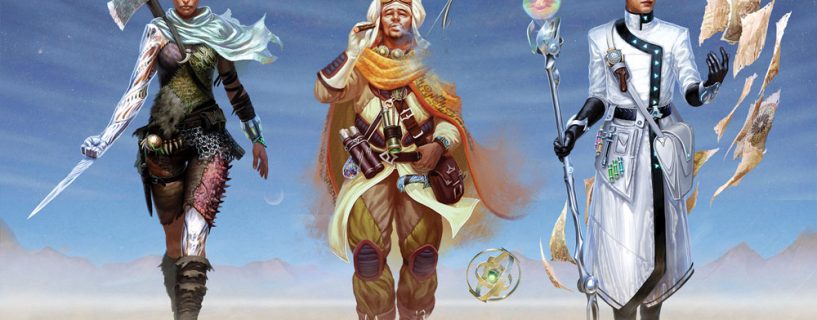“Blood is the currency we pay, to live”
-The First Revelation
To live and die at the behest of a sworn master is not an easy task. Most Errants question their liege silently and behind their backs. Though they are the preeminent warriors of the Triad, the Errant Class are carefully watched for any sign of rebellion. Most are born into a family and thus re trained to serve that family or even lead it by using their power. Others still are found by government backed testers and are then taken away by the local ruling family. Part of the right of claimant all nobles have over Wild Genics. Afterward, they enter a long period of training, perhaps to rise above and become a mecha pilot. Or to fail and their name forever forgotten.
Symbols of Power
An Errant always carries a singing blade made from Soulmetal be it a sword, ax or even a spear. Only they are allowed to wear soulsingers at any given time, and cannot be forced to give them up other than a direct order by their sovereign. Soulsingers are not always decks but are more often than not simply a weapon capable of handling the raw energies of Psi fields. The weapons are almost always decorative and it sets them apart from the rest of the populace.
Errants also possess one final evident difference from the commons and even the nobility. All Errants have the honorific -ri’- applied before their surname. So an Errant member of House Artur would be named Edwyn oc ri’Artur to signify their errant status. The honorific is -always- attached on the surname of the individual to indicate the importance of their bloodline, and they are usually addressed by this honored surname. To note, only a graduate of the Battle Schools is given the honorific those who do not are left without one.
Rank, Respect, and Glory
Errants much like the Guilds have their own internal terminology known as the Knight’s Speech which they use to apply the variety of terms used in everyday life. Some of these terms include old Elder Tongue words to imply a sense of rank among the warriors for their ability and their achievements for their house. Students are entitled, Thaltan or simply surname-tan, for short, a word literally meaning “student” in the old language of the Ancestors. Next are the Cethlén or Attendants who have graduated and have earned their “ri”. Next are the Rhédírlu the veteran commanders who act as masters in battle and life for the Attendants.
Above all the rest are the Fédras, the Adepts, those who have risen so high their names cause fear or adoration when they appear. Life for an Errant is a mixture of constant conflict and an ever shifting dance. Most Errants seek glory in Tournei to compete for prizes in the combat of Mecha. Or they challenge each other to the Singing Death (a duel of two soulsingers). Each and every step is another one that sets them apart from the rest. They might earn the right to marry into a lesser family or even a cadet branch of their liege. Another Errant or their allies might earn a famous nickname to inspire song, holo-dramas and more about their lives.

